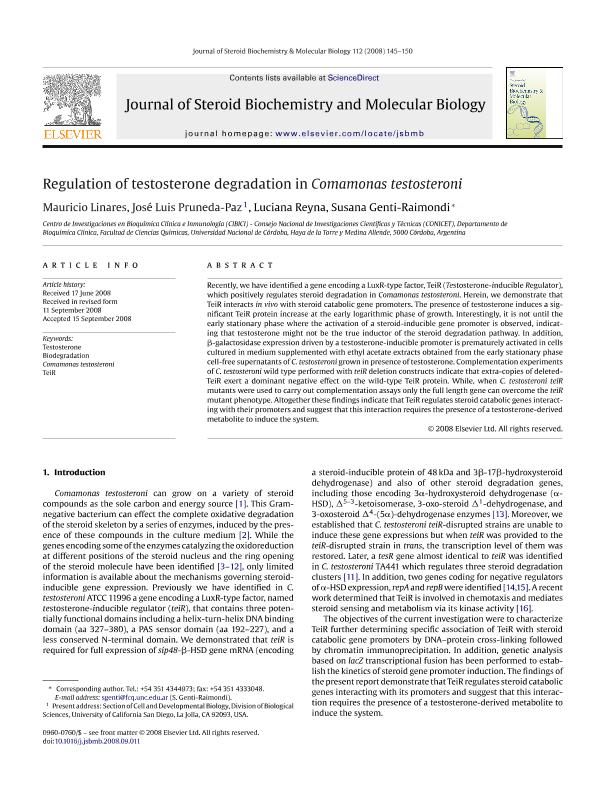Mostrar el registro sencillo del ítem
dc.contributor.author
Linares, Mauricio Adrián

dc.contributor.author
Pruneda Paz, Jose Luis Pablo

dc.contributor.author
Reyna, Luciana

dc.contributor.author
Genti de Raimondi, Susana

dc.date.available
2021-05-19T21:46:37Z
dc.date.issued
2008-11
dc.identifier.citation
Linares, Mauricio Adrián; Pruneda Paz, Jose Luis Pablo; Reyna, Luciana; Genti de Raimondi, Susana; Regulation of testosterone degradation in Comamonas testosteroni; Pergamon-Elsevier Science Ltd; Journal of Steroid Biochemistry and Molecular Biology; 112; 1-3; 11-2008; 145-150
dc.identifier.issn
0960-0760
dc.identifier.uri
http://hdl.handle.net/11336/132304
dc.description.abstract
Recently, we have identified a gene encoding a LuxR-type factor, TeiR (Testosterone-inducible Regulator), which positively regulates steroid degradation in Comamonas testosteroni. Herein, we demonstrate that TeiR interacts in vivo with steroid catabolic gene promoters. The presence of testosterone induces a significant TeiR protein increase at the early logarithmic phase of growth. Interestingly, it is not until the early stationary phase where the activation of a steroid-inducible gene promoter is observed, indicating that testosterone might not be the true inductor of the steroid degradation pathway. In addition, β-galactosidase expression driven by a testosterone-inducible promoter is prematurely activated in cells cultured in medium supplemented with ethyl acetate extracts obtained from the early stationary phase cell-free supernatants of C. testosteroni grown in presence of testosterone. Complementation experiments of C. testosteroni wild type performed with teiR deletion constructs indicate that extra-copies of deleted-TeiR exert a dominant negative effect on the wild-type TeiR protein. While, when C. testosteroni teiR mutants were used to carry out complementation assays only the full length gene can overcome the teiR mutant phenotype. Altogether these findings indicate that TeiR regulates steroid catabolic genes interacting with their promoters and suggest that this interaction requires the presence of a testosterone-derived metabolite to induce the system.
dc.format
application/pdf
dc.language.iso
eng
dc.publisher
Pergamon-Elsevier Science Ltd

dc.rights
info:eu-repo/semantics/openAccess
dc.rights.uri
https://creativecommons.org/licenses/by-nc-sa/2.5/ar/
dc.subject
BIODEGRADATION
dc.subject
COMAMONAS TESTOSTERONI
dc.subject
TEIR
dc.subject
TESTOSTERONE
dc.subject.classification
Biología Celular, Microbiología

dc.subject.classification
Ciencias Biológicas

dc.subject.classification
CIENCIAS NATURALES Y EXACTAS

dc.title
Regulation of testosterone degradation in Comamonas testosteroni
dc.type
info:eu-repo/semantics/article
dc.type
info:ar-repo/semantics/artículo
dc.type
info:eu-repo/semantics/publishedVersion
dc.date.updated
2021-04-23T16:47:56Z
dc.journal.volume
112
dc.journal.number
1-3
dc.journal.pagination
145-150
dc.journal.pais
Reino Unido

dc.description.fil
Fil: Linares, Mauricio Adrián. Consejo Nacional de Investigaciones Científicas y Técnicas. Centro Científico Tecnológico Córdoba. Centro de Investigaciones en Bioquímica Clínica e Inmunología; Argentina
dc.description.fil
Fil: Pruneda Paz, Jose Luis Pablo. Universidad Nacional de Córdoba. Facultad de Ciencias Químicas; Argentina
dc.description.fil
Fil: Reyna, Luciana. Consejo Nacional de Investigaciones Científicas y Técnicas. Centro Científico Tecnológico Córdoba. Centro de Investigaciones en Bioquímica Clínica e Inmunología; Argentina
dc.description.fil
Fil: Genti de Raimondi, Susana. Consejo Nacional de Investigaciones Científicas y Técnicas. Centro Científico Tecnológico Córdoba. Centro de Investigaciones en Bioquímica Clínica e Inmunología; Argentina
dc.journal.title
Journal of Steroid Biochemistry and Molecular Biology

dc.relation.alternativeid
info:eu-repo/semantics/altIdentifier/url/http://www.sciencedirect.com/science/article/pii/S0960076008002318
dc.relation.alternativeid
info:eu-repo/semantics/altIdentifier/doi/https://doi.org/10.1016/j.jsbmb.2008.09.011
Archivos asociados
